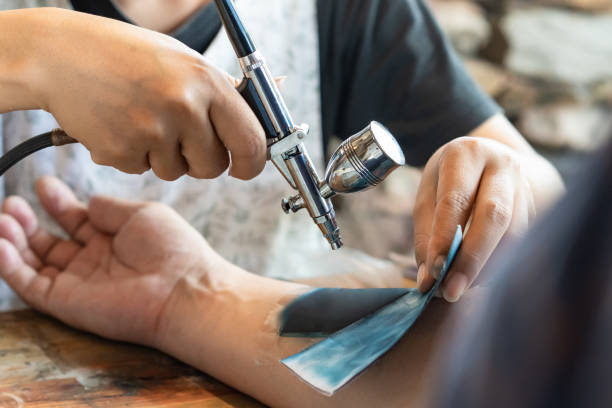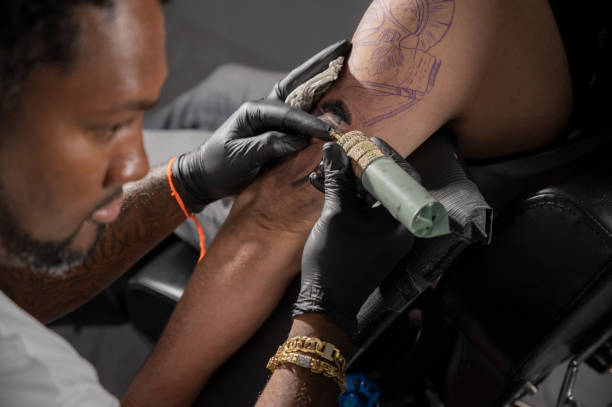Contents
Can black get colored tattoos?
When it comes to the art of tattooing, one question that often arises is: Can black individuals get colored tattoos? The answer may surprise you. Tattoos, with their vibrant hues and intricate designs, have long been admired as expressions of personal style and identity. Yet, the dynamics of tattooing on black skin present unique considerations that deserve exploration.
Understanding Black Skin and Tattooing
Before delving into the world of colored tattoos on black skin, it’s essential to grasp the nuances of melanin and its impact. Melanin, the pigment responsible for skin color, varies in concentration among individuals, resulting in diverse skin tones. Black skin, characterized by higher melanin levels, possesses its own distinct qualities, including richness and depth of color.

Tattooing on black skin requires a nuanced approach due to melanin’s role in the tattooing process. Traditional tattooing methods often cater to lighter skin tones, posing challenges such as pigment visibility and contrast on darker skin. However, advancements in tattooing techniques and pigment formulations have paved the way for colorful creations on all skin tones.
Factors to Consider for Colored Tattoos on Black Skin
Creating vibrant, lasting tattoos on black skin entails careful consideration of several factors. The choice of tattoo artist plays a pivotal role, as expertise in tattooing diverse skin tones is paramount. A skilled artist understands the complexities of melanin distribution and employs techniques to achieve optimal results.

- Choice of Tattoo Artist: Selecting the right tattoo artist is paramount when considering colored tattoos on black skin. Look for artists with experience and expertise in tattooing diverse skin tones. A skilled artist understands the nuances of melanin distribution and can adapt techniques to achieve optimal results.
- Understanding Skin Undertones: Black skin may have varying undertones, such as warm or cool tones. Understanding these undertones is essential for selecting complementary colors that will enhance the vibrancy of the tattoo. Working with an experienced artist can ensure that color choices harmonize with individual skin characteristics.
- Skin Preparation: Proper skin preparation is crucial for successful colored tattoos on black skin. This includes moisturizing the skin regularly to ensure optimal hydration and elasticity. Well-moisturized skin provides a smooth canvas for tattoo application and promotes better ink retention.
- Color Selection: When choosing colors for tattoos on black skin, consider factors such as pigment visibility and contrast. Vibrant colors may appear differently on black skin compared to lighter skin tones, so it’s essential to select hues that will pop and maintain their intensity over time.
- Consultation and Test Patches: Prior to tattooing, schedule a consultation with your chosen artist to discuss design ideas and color preferences. Test patches can be helpful in determining how colors will appear on your skin and allow for adjustments before committing to the full tattoo.
- Layering and Shading Techniques: Skilled tattoo artists employ layering and shading techniques to enhance the depth and dimension of colored tattoos on black skin. By layering pigments strategically, artists can achieve rich, multidimensional effects that complement the natural beauty of the skin.
- Customization: Each individual’s skin is unique, and customization is key to achieving the best results with colored tattoos on black skin. Work closely with your tattoo artist to tailor the design to your skin’s specific characteristics, ensuring a tattoo that not only looks stunning but also ages gracefully over time.
Additionally, understanding skin undertones is crucial in selecting complementary colors for tattoos on black skin. Warm undertones may enhance the vibrancy of certain hues, while cool undertones might require adjustments to achieve desired effects. Collaborating with an experienced artist ensures that color choices harmonize with individual skin characteristics.
Techniques and Approaches for Successful Colored Tattoos on Black Skin
Achieving stunning colored tattoos on black skin involves employing specialized techniques and approaches. Artists may utilize layering and shading methods to create depth and dimension within the tattoo design. By layering pigments strategically, artists can enhance color saturation and contrast, resulting in visually captivating tattoos.
Moreover, customizing tattoo designs based on individual skin characteristics is essential for optimal outcomes. Through meticulous planning and consultation, artists tailor each tattoo to accentuate the natural beauty of black skin. Test patches and trial runs enable clients and artists to assess color vibrancy and compatibility, ensuring a cohesive final result.
Risks and Challenges
While colored tattoos on black skin yield stunning aesthetic outcomes, they are not without risks and challenges. Ink migration and fading are potential concerns, particularly if proper aftercare practices are not followed. Allergic reactions to tattoo pigments may occur, emphasizing the importance of using high-quality, hypoallergenic materials.
Furthermore, the healing process for tattoos on black skin requires attentive care to minimize scarring and promote optimal color retention. Adhering to post-tattoo care instructions, such as moisturizing and avoiding sun exposure, is vital for preserving the integrity of the tattoo.

Success Stories and Examples
Despite challenges, numerous success stories illustrate the transformative potential of colored tattoos on black skin. From intricate floral motifs to vibrant abstract designs, black individuals proudly showcase their personalized tattoos as reflections of identity and culture. Renowned tattoo artists specializing in diverse skin tones have garnered acclaim for their innovative techniques and stunning creations.
Cultural and Societal Perspectives
Cultural and societal perspectives surrounding colored tattoos on black skin are rich with historical significance and contemporary relevance. Within black communities, tattoos serve as powerful expressions of cultural heritage, personal identity, and social commentary.
Historically, tattoos have played integral roles in various African cultures, symbolizing rites of passage, spiritual beliefs, and tribal affiliations. The practice of tattooing predates colonialism and has been intertwined with rituals and traditions passed down through generations. In many African societies, tattoos serve as visual narratives, conveying stories of resilience, lineage, and interconnectedness.
In the diaspora, particularly within African American and Afro-Caribbean communities, tattoos continue to hold profound cultural significance. They serve as symbols of empowerment, defiance, and self-determination in the face of historical oppression and systemic inequalities. Through tattoos, individuals reclaim agency over their bodies and narratives, asserting autonomy and reclaiming cultural heritage.
Moreover, colored tattoos on black skin provide a platform for storytelling and artistic expression, reflecting diverse experiences and perspectives within black communities. Tattoo designs often incorporate motifs and symbols rooted in African spirituality, folklore, and symbolism, serving as visual affirmations of cultural pride and resilience.
In contemporary society, colored tattoos on black skin challenge conventional beauty standards and redefine notions of aesthetics and adornment. They serve as acts of rebellion against Eurocentric ideals of beauty and conformity, embracing the inherent beauty and complexity of blackness. By celebrating black skin as a canvas for artistic expression, colored tattoos dismantle stereotypes and promote visibility and representation within the tattoo industry.
Furthermore, the presence of black tattoo artists and voices within the industry underscores the importance of diversity and inclusivity. Black artists bring unique perspectives, experiences, and cultural insights to their craft, reshaping narratives and challenging systemic barriers. Through mentorship programs, community outreach, and collaborative projects, black artists foster creativity, camaraderie, and solidarity within the tattoo community.

In essence, cultural and societal perspectives on colored tattoos on black skin are multifaceted and evolving. They reflect a rich tapestry of history, resilience, and creative expression, affirming the inherent beauty and diversity of black identity. As the tattoo industry continues to embrace inclusivity and representation, colored tattoos on black skin serve as enduring symbols of empowerment, visibility, and cultural pride.
Conclusion
In conclusion, the question of whether black individuals can get colored tattoos is met with a resounding affirmation. Through collaboration, innovation, and cultural appreciation, tattoo artists continue to push boundaries and redefine artistic possibilities. Colored tattoos on black skin celebrate diversity, creativity, and the beauty of individuality.
As the tattoo industry evolves, embracing inclusivity and embracing the rich tapestry of human experience remain at its core. So, to answer the question definitively: Yes, black can indeed get colored tattoos—and the results are nothing short of spectacular.





